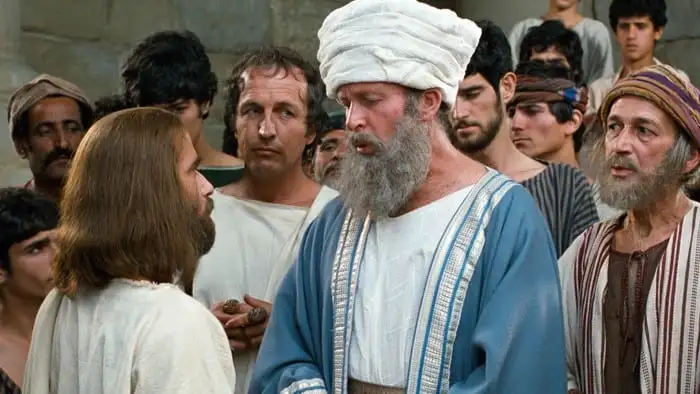What Are the Beatitudes?

Related Posts
Subscribe To Our Weekly Newsletter
Sign up for our weekly newsletter, Jesus Film Project News, to receive encouraging stories, videos and resources in your inbox.
Jesus begins His Sermon on the Mount with a series of sayings that has come to be known as the Beatitudes. It’s difficult to understand these sayings without familiarizing ourselves with their context.
The fifth chapter of Matthew’s Gospel begins very simply: “Now when Jesus saw the crowds, he went up on a mountainside and sat down. His disciples came to him, and he began to teach them” (Matthew 5:1-2).
And with that, Matthew details the most important sermon ever preached. We would be hard-pressed to overemphasize the significance of the Sermon on the Mount. Even people who know nothing about Christianity regularly use terms that spring directly from this one sermon:
- Salt of the earth
- Go the extra mile
- Turn the other cheek
- Judge not lest ye be judged
- Do unto others
The fact that these terms have wormed their way into our collective consciousness demonstrates the cultural impact this sermon has had. Many have reinforced its importance:
No greater blessing could come to our land today than a revival of the spirit of religion. I doubt if there is any problem in the world today-social, political, or economic-that would not find a happy solution if approached in the spirit of the Sermon on the Mount. -President Franklin D. Roosevelt
We live in a world of nuclear giants and ethical infants, in a world that has achieved brilliance without wisdom, power without conscience. We have solved the mystery of the atom and forgotten the lessons of the Sermon on the Mount. We know more about war than we know about peace, more about dying than we know about living. -General Omar N. Bradley
Most people are willing to take the Sermon on the Mount as a flag to sail under, but few will use it as a rudder by which to steer. -Chief Justice Oliver Wendell Holmes
There’s little question that Jesus’s Sermon on the Mount is one of the most well-known messages from any religious leader in any era.
And it all starts with the Beatitudes.
Discovering the Beatitudes
The Beatitudes are eight (or nine) statements that introduce the Sermon on the Mount:
- Blessed are the poor in spirit, for theirs is the kingdom of heaven.
- Blessed are those who mourn, for they will be comforted.
- Blessed are the meek, for they will inherit the earth.
- Blessed are those who hunger and thirst for righteousness, for they will be filled.
- Blessed are the merciful, for they will be shown mercy.
- Blessed are the pure in heart, for they will see God.
- Blessed are the peacemakers, for they will be called children of God.
- Blessed are those who are persecuted because of righteousness, for theirs is the kingdom of heaven.
Shouldn’t there be nine Beatitudes?
Some people count Matthew 5:11-12 as another Beatitude:
Blessed are you when people insult you, persecute you and falsely say all kinds of evil against you because of me. Rejoice and be glad, because great is your reward in heaven, for in the same way they persecuted the prophets who were before you.
While many commentators and academics include this passage as part of the “blessed are the persecuted” Beatitude, it makes sense to see it as a stand-alone Beatitude. There is some debate over the exact number of Beatitudes, but coming to a consensus on how they’re counted isn’t as important as what they communicate.
Where do we even get the term Beatitude?
In Latin, each Beatitude begins with the word “beati” or “beatus.” In the Vulgate, the first Beatitude reads this way:
“beati pauperes spiritu quoniam ipsorum est regnum caelorum.”
“Beati” means blessed and it’s the word “Beatitude” comes from in Latin, meaning the condition or statement of blessedness. The Beatitudes instruct us in what it means to be blessed.
What does it mean to be blessed?
The Greek term translated as “beati”in Latin and “blessed” in English is “makarios” (happy, content). The ancient Greeks used the word “makarios” when speaking about the gods. They were “the blessed ones.”
Even though the Greek gods were often portrayed as squabbling amongst themselves and getting involved in worldly affairs, they were still seen as being above human worries and concerns. They didn’t have to trouble themselves with work, meeting daily needs, or even death. The very fact that they could spend time entertaining quarrels and vanities was a sign that they were blessed beyond human cares.
For this reason, “makarios” was also used to refer to the dead. Like the gods, people who had passed on were considered free from worldly affairs. They no longer had to bother themselves with the troublesome aspects of human life.
When makarios was used by contemporaries of Jesus to talk about living people, it had many of the same connotations. The makarios were those who were separated from common folk. It could be that they were rich enough that they didn’t have to worry about unsafe neighborhoods or Roman interference. They had the honor and respect that came from abundant crops, beauty, and riches. One could be happy when free from the concerns endured by the less fortunate.
And then Jesus stepped in and turned the word on its head.
How is this blessed?!
When Jesus uses “makarios,” He uses it in relation to things that first-century Jews would be more apt to associate with curses than with blessings. Most people in Jesus’s audience were poor and were used to being abused by Rome. They would have loved to be above life’s struggles, but they were in the thick of them.
When Jesus tells them that it’s blessed to mourn or to be meek, they would have been shocked. They’d had their fill of mourning, and most of it was because they were too meek to do anything to improve their lot.
They were waiting for a Messiah who would deliver them from their woes. And Jesus seemed to be telling them that they were blessed in the midst of their troubles. At first glance, this isn’t the message they wanted to hear.
Taking a closer look at the Beatitudes
When we read the Sermon on the Mount, we have the luxury of seeing it through the story of Scripture. We know that the Gospels end in a crucifixion and resurrection. This gives us a perspective on Jesus’s words that would have been missed by the first people who heard Him.
But sometimes it’s helpful to keep the first listeners in mind as you read Jesus words. While our understanding is enriched by our point of reference, Jesus didn’t intend for everything He said to be a complete mystery to His original audience.
Most of us are so used to hearing the Beatitudes that much of the impact and shock of Jesus’s words has been lost. So let’s take a look at each of the Beatitudes, keeping an eye on how they would have been interpreted by the crowd that heard Him that day.
Blessed are the poor in spirit
The word Jesus used for poor (ptōchoi) is fairly severe. It’s not a word you use for someone who’s down on their luck or going through a rough patch. It’s a word associated with beggars. These are poor people who have to live off the kindness of others-a group that would have been despised and miserable.
By adding “in spirit” to this description, Jesus points out exactly where their poverty lies. These people would have none of their own spiritual resources. They would rely on the kindness of God to supply them with those riches.
This would have been in stark contrast to those who were considered spiritually rich. For instance, the Pharisees and Sadducees were considered righteous for their adherence to God’s law. They were thought to be rich in spirit. Jesus’s words would have seemed like a slap in the face of those whose goodness was related to their ability to follow God’s commands.
In a startling switch on the status quo, Jesus said that the kingdom of God belongs to those spiritual beggars and not the spiritually respected and admired.
Blessed are those who mourn
We tend to hear the word “mourn” and think about grieving for the dead. The Greek word “penthountes” is more closely related to lamenting. Paul uses a version of the same word in his first letter to the Corinthians:
And you are proud! Shouldn’t you rather have gone into mourning and have put out of your fellowship the man who has been doing this? (1 Corinthians 5:2)
In the past when Israel was occupied by a foreign power, prophets would have called them to mourn the sins of the nation. This would cause God to hear and send a deliverer. For the Roman-occupied audience of this sermon, Jesus’s call to mourn would have had the same connotation.
But the promise that they would be comforted would have been a surprise. They weren’t looking to be comforted; they were waiting for deliverance. Even after Jesus was resurrected, the disciples were still expecting Israel to be delivered:
Then they gathered around him and asked him, “Lord, are you at this time going to restore the kingdom to Israel?” (Acts 1:6)
Jesus was slowly beginning to challenge their expectations of the Messiah.
Blessed are the meek
When we hear the word “meek” we tend to associate it with timidity, but the word Jesus used (praeis) was much closer to gentle or mild. Basically, Jesus was addressing the powerless. The connotation was similar to a stallion who had been broken to submit to a master.
The gentle would inherit the earth. This was important for Jesus’ listeners to grasp. The earth wouldn’t be taken by force, it would be handed down. This means that it didn’t pay to be strong and forceful. It was more important to trust in God, and wait for God to move on our behalf.
Blessed are those who hunger and thirst for righteousness
Throughout the Old Testament, God offered refreshment to the faithful:
Let them give thanks to the Lord for his unfailing love and his wonderful deeds for mankind, for he satisfies the thirsty and fills the hungry with good things (Psalm 107:8-9).
Come, all you who are thirsty, come to the waters; and you who have no money, come, buy and eat! Come, buy wine and milk without money and without cost (Isaiah 55:1).
People will live together in Judah and all its towns-farmers and those who move about with their flocks. I will refresh the weary and satisfy the faint (Jeremiah 31:24-25).
Jesus’s promise that those who hungered and thirst for righteousness would be filled would have made instant sense to those gathered as an extension of God’s promise to His people.
Blessed are the merciful
If you count nine Beatitudes, this one’s at the center. It makes sense-mercy is at the center of Matthew’s Gospel. At every opportunity, Matthew attempts to drive this truth home:
And forgive us our debts, as we also have forgiven our debtors (Matthew 6:12). … For if you forgive other people when they sin against you, your heavenly Father will also forgive you. But if you do not forgive others their sins, your Father will not forgive your sins (Matthew 6:14-15).
This is how my heavenly Father will treat each of you unless you forgive your brother or sister from your heart (Matthew 18:35).
In a culture steeped in retaliatory justice, mercy was a huge paradigm shift. In fact, Jesus addresses this later in the Sermon on the Mount:
You have heard that it was said, “Eye for eye, and tooth for tooth.” But I tell you, do not resist an evil person. If anyone slaps you on the right cheek, turn to them the other cheek also. And if anyone wants to sue you and take your shirt, hand over your coat as well. If anyone forces you to go one mile, go with them two miles. Give to the one who asks you, and do not turn away from the one who wants to borrow from you (Matthew 5:38-42).
Blessed are the pure in heart
In Jewish culture, purification was about following rituals. If you wanted to be clean before God, you followed the rules. This wasn’t necessarily God’s intention. Throughout the Old Testament, we see a focus on purity of heart:
Who may ascend the mountain of the Lord? Who may stand in his holy place? The one who has clean hands and a pure heart, who does not trust in an idol or swear by a false god (Psalm 24:3-5).
Over time, ritual cleanliness became purity’s focus. Toward the end of Matthew’s Gospel, we see Jesus challenge the Pharisees about this:
Woe to you, teachers of the law and Pharisees, you hypocrites! You clean the outside of the cup and dish, but inside they are full of greed and self-indulgence (Matthew 23:25).
This statement would have surprised this crowd, not because they were unfamiliar with purity of heart, but because it would have felt incomplete. How can we see God apart from being ritually clean?
As the story of Jesus was revealed, it became clear that purity of heart would be ascribed or imputed to Jesus’ followers.
Blessed are the peacemakers
First-century Palestine was full of tension. Many in Judea were praying fervently for a deliverer, while others were embracing more desperate measures. One of the disciples was a member of the zealots, a group focused on throwing Rome out of Judea-by force if necessary.
Jesus tells His listeners that the children of God will be peacemakers. Unlike peace lovers who might do whatever they can to avoid conflict, peacemakers are willing to wade through discord in order to create reconciliation.
Blessed are those who are persecuted because of righteousness
One of the reasons people make this is the last Beatitude is that it it mirrors the first one. Both of them close with “for theirs is the kingdom of God.”
The Jews knew what it meant to be a persecuted people. Their whole history was a story of mistreatment at the hands of other nations. This would have sounded like an encouragement and a reminder that God recognized what it cost Israel to serve Him.
But the message changes as He addresses those who will follow Him specifically:
Blessed are you when people insult you, persecute you and falsely say all kinds of evil against you because of me. Rejoice and be glad, because great is your reward in heaven, for in the same way they persecuted the prophets who were before you (Matthew 5:11-12).
For those first Christians who will look back on this sermon, Jesus offers an essential message. They’re going to suffer at the hands of Roman authorities for not worshiping Caesar and they’re going to be abused by their fellow Jews for abandoning traditional Judaism. Jesus is telling them not to lose heart. Those closest to Him-like the prophets-have always been abused for speaking the truth.
Why the Beatitudes are unconventional
Jesus opens the world’s most well-known sermon with a series of shocking statements. People didn’t associate mourning or meekness with blessedness. The ancient world was full of stories where characters were blessed with riches, strength, popularity, and power. Jesus upends all that.
The kingdom that Jesus promotes is an upside-down kingdom where humanity’s idea of blessings doesn’t seem to apply. And with these Beatitudes, Jesus begins to reframe what it means to be blessed by God.
All Scripture references quote the New International Version unless otherwise noted.


